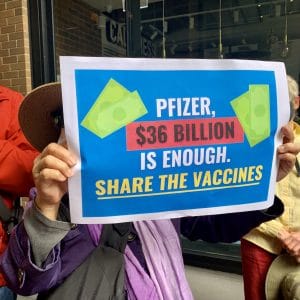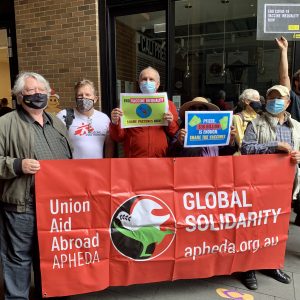Kate Lappin is the Asia-Pacific Regional Secretary for Public Services International. She presented this speech to Union Aid Abroad-APHEDA’s annual general meeting on December 13, 2021.
***
I’m sure I don’t need to convince any of you that the rules of the global economy – particularly the trade rules – are deeply unjust and designed to enrich the few at the expense of the many. Trade rules, written by corporations like Pfizer, have been instrumental in the growth of corporate power over economies but also over our public goods, our decision-making, and our democracies.
The current campaign for a waiver of the World Trade Organisations TRIPS agreement – the agreement that enforces intellectual property rights of corporations – is important because, clearly as unions we share a collective belief that solidarity and care for each other, not greed, self-interest and corporate or capital growth, should be the guiding principles of societies.
 But, knowing that governments are rarely responsive to calls for international solidarity (despite it being a principle of international law), our campaign also appeals to self-interest. The only way to avoid a prolonged pandemic, to avoid further lockdowns, to avoid more deaths and the collapse of health systems, is through making vaccinations widely available to ensure no new variants are able to emerge.
But, knowing that governments are rarely responsive to calls for international solidarity (despite it being a principle of international law), our campaign also appeals to self-interest. The only way to avoid a prolonged pandemic, to avoid further lockdowns, to avoid more deaths and the collapse of health systems, is through making vaccinations widely available to ensure no new variants are able to emerge.
But I also want to stress that the TRIPS campaign is an opportunity to help workers understand why we should be doing more to stop unjust trade agreements and trade rules that are an absolute threat to workers securing just and fair wages and conditions, a threat to our desire for all people to live a dignified and healthy life, and a threat to the planet and ability to address the climate crisis.
Because this is a time for unions to provide a vision for alternative ways to organise society.
It’s useful to ask ourselves what would have happened if neoliberalism was not pervasive, if public health was put ahead of profits. If that was the case governments would make sure that all people, in all countries, would have access to a vaccine as quickly as possible. To make that happen, all countries would support vaccine research, share their results and then make sure that all countries with manufacturing capacity were prepared to manufacture the vaccine and treatments and could scale up immediately. If the manufacturing capacity was not public (and we think governments should retain pharmaceutical manufacturing capacity as several countries have), governments should have been able to direct and take over manufacturing. Governments have done that in wartime. We know it’s possible.
Vaccine apartheid
Instead, we’ve witnessed vaccine apartheid. Rich countries have acquired 7 billion vaccine doses and can vaccinate their own populations up to seven times while half the world’s population is yet to receive a dose. Across Africa the vaccination rate of adults is only 7% and much less in many countries. Australia has purchased enough doses to vaccinate the population six times over
We know that Pfizer has provided less than 1% of its vaccines to low-income countries
We know that by May this year at least 115,000 health workers, but more likely 180,000, had died and more die every day.
We know that half a billion people were pushed into extreme poverty last year as a result of health costs.
We know that there has been an unprecedented transfer of wealth. In the first year alone, workers lost $3.7 trillion while billionaires gained $3.9 trillion.
We know that Pfizer has made an unprecedented $36 billion and expects another record year.
We know these profits came at the expense of people’s lives and were only enabled by workers who are often delivering the vaccine at risk, unpaid. One of the unspoken tragedies of monopoly patent costs is that countries have had to spend large amounts of their budgets on vaccines which often means public sector wage cuts and workers like community health workers being denied wages.
And we know that Pfizer and Moderna received $8 billion in public money to produce their vaccines which utilised public sector research. And yet they lead the campaign against the waiver.
History of the waiver
The TRIPS agreement basically provides for monopoly rights on patents for pharmaceuticals (and other patents). It was adopted in the 1990s after years of lobbying, lead by Pfizer, to have intellectual property included in the new global trade rules when the World Trade Organization was established in 1995. It was not supported by many countries.
Indian Prime Minister Indira Gandhi initially said: “The idea of a better-ordered world is one in which medical discovery will be free of all patents and there will be no profiteering from life and death.”
India didn’t allow for pharmaceutical products to be patented prior to TRIPS.
But the TRIPS agreement went ahead after lots of pressure from the United States and European Union and now countries are barred from producing existing vaccines unless they have negotiated an agreement with one of the companies.
 The HIV crisis proved that these rules are a death sentence to many in the developing world. In 2000, the Doha round recognised the need to waive intellectual property rules on medicines when a public health crisis necessitates it and as many have said before, if this pandemic is not a crisis, what is?
The HIV crisis proved that these rules are a death sentence to many in the developing world. In 2000, the Doha round recognised the need to waive intellectual property rules on medicines when a public health crisis necessitates it and as many have said before, if this pandemic is not a crisis, what is?
Countries that have put public health ahead of monopoly rights of big pharma have made major gains in public health. Thailand was threatened for years by the US for making generic anti-retrovirals and other generics and has drastically reduced rates of HIV. Epidemiologists think this variant has come from an untreated HIV or otherwise immuno compromised person, proving even more why public health is a global public good (if justice isn’t enough).
Public Services International had been calling for intellectual property trade rules to be waived since we released the nurses manifesto in May 2020. In October 2020, South Africa and India presented the WTO with a proposal to temporarily waive these rules for the duration of the pandemic so that vaccines can be manufactured across different countries, increasing their availability, reducing their cost and ensuring that they are delivered to everyone on earth as quickly as possible.
Unions around the world have campaigned in support of the waiver, but also to use this moment to fundamentally change the rules that put profits before people and before public health.
These campaigns have worked – they have shifted governments. The US Biden administration supported the waiver after unions and civil society ran an effective campaign. In our region, New Zealand was one of the first to support the waiver after unions, including Pacific unions, wrote to them. And finally, thanks to a strong union and civil society campaign in Australia that included an important role for APHEDA, the federal opposition and then the federal government announced it would no longer oppose the waiver. This support has also put pressure on Big Pharma to be less obvious in their profiteering and make concessions. For example, Merck has made agreements with generic manufacturers for its treatment in some countries which means some countries will be paying $US12 ($AU16) per pill, while the US agreed to pay $US712 ($AU968) per treatment course. But Big Pharma, like all corporations, have a fiduciary duty to put its shareholder’s interests ahead of the public good. So, these concessions will only amount to small exercises in branding.
This campaign is working, but the union movement must keep up this pressure until the waiver is adopted and, critically, until the obnoxious, anti-worker, neoliberal and deadly trade rules are abolished once and for all.